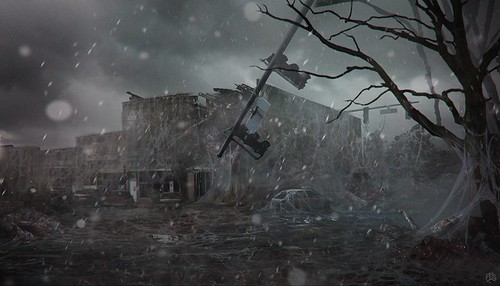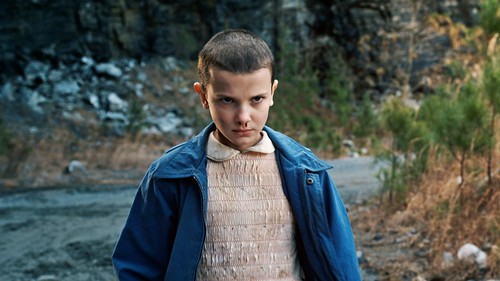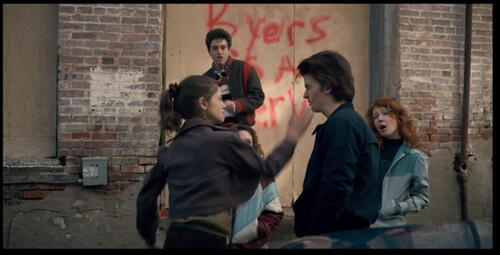A. Watched something scary.
I don't watch scary/violent anythings ever. I can't even with Game of Thrones. I think it's despicable. Walking Dead? You would have to pay me huge sums of cash to even THINK about watching such filth! That said, I will pretty much watch anything that is teen drama related--ESPECIALLY period teen dramas that focus on the trials and tribulations of suburban tweens and teenagers. And while I was but a toddler in the early 80s, I know that world. I grew up with E.T. And Goonies. And smocked dresses and Huffys. You got me, Stranger Things. You had me at de de de de de de de de...
B. Binge watched something this fast.
Hal and I watched Stranger Things over the course of a few days and now I'm all end-of-summer balmy with thoughts -- and in the case of today's post, attempts to draw parallels between Stranger Things and parents (and older kids/teenagers) preparing for back-to-school. Oh and P.S. THIS SHOW IS NOT FOR YOUNG CHILDREN AT ALL. THIS SHOW IS FOR ADULTS OR OLDER TEENAGE CHILDREN. (Common Sense Media says 14+ and that seems accurate.)
WARNING: SPOILERS AHEAD:
***
NAVIGATING BACK-TO-SCHOOL WITH
LESSONS LEARNED FROM STRANGER THINGS
1. The Upside Down is basically The Internet
A dangerous place that is essentially the inverse of real life? Where scary things can snatch you up and feed on your very soul? A place that is very hard to escape once you're in? I mean, let this be a cautionary tale, my darlings. THE INTERNET IS A MONSTER.
Not all the time, mind you. But here are some helpful (hopefully) tips for parents and children who are new to social media/the Internet.
- Keep social media accounts private.
I personally believe every child has his/her right to their own privacy and do not believe in snooping through text messages/etc. I do believe in non-judgmental communication and being super open and honest with my own social media/teenage missteps and mistakes. Being the example, in my experience, is always the best way to guide.
- Put time limits on social media - limiting screen time at night.
This is pretty self-explanatory but important to reiterate. Teenagers need A LOT OF sleep and studies are finding that these days (I just shook my cane in the air), they're unable to unplug and get the rest they need. Keeping phones out of bedrooms is a great way to enforce better sleep habits. (For parents, too.)
- Have the Internet porn conversation
If your kid has been on the Internet for longer than a week, there's a good chance he/she has stumbled into Internet pornland. More than once. If you're not talking to your kids about Internet porn, you really need to think about doing so. And regardless of whether you have parent controls on your own Internet/your kids devices, you cannot parent control everything. (Just because you have Hustler magazines underneath your bed, doesn't mean your kid's BFF's parents haven't hidden theirs.)
You can start by asking your kid(s) if they have ever seen anything they didn't understand online and go from there. For me, talking about Internet porn is very similar to talking to kids about ALL THINGS THAT ARE NOT REAL.
Just because it looks like people are enjoying themselves, doesn't mean they are.
Sex is something you will want to do someday but this IS NOT SEX in the same way science fiction books are not real life and talking animals are not real.
Also, here's a GREAT RESOURCE for talking to your kids about Internet Pornography.
- Discuss "likes" and their effect on social media users (of all ages and genders).
Likes are the worst. I wish there was a way we could select NO on making them available because they CAN ONLY NEGATIVELY affect. That said, they are a reality for anyone who uses social media.
- Model positive social media skills.
How often are you on Instagram? At what time of night do you turn it off? What kinds of things do you post? And how would you feel if your child was posting the same things? All important questions to ask, I think.
A dangerous place that is essentially the inverse of real life? Where scary things can snatch you up and feed on your very soul? A place that is very hard to escape once you're in? I mean, let this be a cautionary tale, my darlings. THE INTERNET IS A MONSTER.
Not all the time, mind you. But here are some helpful (hopefully) tips for parents and children who are new to social media/the Internet.
- Keep social media accounts private.
I personally believe every child has his/her right to their own privacy and do not believe in snooping through text messages/etc. I do believe in non-judgmental communication and being super open and honest with my own social media/teenage missteps and mistakes. Being the example, in my experience, is always the best way to guide.
- Put time limits on social media - limiting screen time at night.
This is pretty self-explanatory but important to reiterate. Teenagers need A LOT OF sleep and studies are finding that these days (I just shook my cane in the air), they're unable to unplug and get the rest they need. Keeping phones out of bedrooms is a great way to enforce better sleep habits. (For parents, too.)
- Have the Internet porn conversation
If your kid has been on the Internet for longer than a week, there's a good chance he/she has stumbled into Internet pornland. More than once. If you're not talking to your kids about Internet porn, you really need to think about doing so. And regardless of whether you have parent controls on your own Internet/your kids devices, you cannot parent control everything. (Just because you have Hustler magazines underneath your bed, doesn't mean your kid's BFF's parents haven't hidden theirs.)
You can start by asking your kid(s) if they have ever seen anything they didn't understand online and go from there. For me, talking about Internet porn is very similar to talking to kids about ALL THINGS THAT ARE NOT REAL.
Just because it looks like people are enjoying themselves, doesn't mean they are.
Sex is something you will want to do someday but this IS NOT SEX in the same way science fiction books are not real life and talking animals are not real.
Also, here's a GREAT RESOURCE for talking to your kids about Internet Pornography.
- Discuss "likes" and their effect on social media users (of all ages and genders).
Likes are the worst. I wish there was a way we could select NO on making them available because they CAN ONLY NEGATIVELY affect. That said, they are a reality for anyone who uses social media.
- Model positive social media skills.
How often are you on Instagram? At what time of night do you turn it off? What kinds of things do you post? And how would you feel if your child was posting the same things? All important questions to ask, I think.
2. T(w)eenage girls are the most powerful human beings in the world
This is important for both boys and girls to recognize and not in a sexist-toward-boys kind of way. Girl power is real and it affects boys (and men) in ways that even boys (and men) don't fully understand. This is why TALKING to our daughters about their power over their own lives AS WELL AS BOYS is important.
Typically, media shows girls as boy-crazy lunatics, but the fact of the matter is, boys are THE EXACT SAME WAY but aren't given diaries to write about it or love songs or games like MASH to play in the PE locker room (Do people play MASH? Did I just make that up?) Hell, boys aren't really given any outlet at all.
The truth is, in the same way teenage girls are struggling with their own sexuality and pressures therein, teenage boys are, too. A lot of boys don't know what to say to girls or how to say it and are modeled (care of music/movies/media) pretty horribly sexist shit.
As a teenage girl, I knew I had power. And as the mother of a soon-to-be-teenage son, I am only NOW seeing what life looks like from his POV and while I believe that all girls, teenage or not, should own their power, we need to give our boys the tools to better navigate their feelings about that power.
3. Assholes "slut"shame. Don't be an asshole
This goes for parents of teenagers as much as it does for teenagers, themselves. NEVER define nor degrade a girl based on WHAT SHE DOES AND DOES NOT DO SEXUALLY. EVER. If you have a problem with someone because of the way they provocatively dress, don't say so out loud in front of your young children. You are merely reinforcing that it's okay for them to do the same. (One can express worry about other children/teenagers behavior without shaming other children/teenagers.) Also, calling out women (or girls) for their sexual prowess (falsified OR real And let's be real, A LOT OF WHAT IS SAID during the teenage years is rumor-laden and falsified.) Saying or acting negatively toward a girl (or woman) based on her sexuality/physical identification is bullying, plain and simple. It also promotes rape culture, reinforces double standards, and is DANGEROUS. Remember, as a parent, your kids are LISTENING to your words. They are INTERNALIZING your judgement. And they are, most likely, passing it on.
Signed, someone who spent much of her high school years trying to rinse the word "SLUT" off her driveway...
This is important for both boys and girls to recognize and not in a sexist-toward-boys kind of way. Girl power is real and it affects boys (and men) in ways that even boys (and men) don't fully understand. This is why TALKING to our daughters about their power over their own lives AS WELL AS BOYS is important.
Typically, media shows girls as boy-crazy lunatics, but the fact of the matter is, boys are THE EXACT SAME WAY but aren't given diaries to write about it or love songs or games like MASH to play in the PE locker room (Do people play MASH? Did I just make that up?) Hell, boys aren't really given any outlet at all.
The truth is, in the same way teenage girls are struggling with their own sexuality and pressures therein, teenage boys are, too. A lot of boys don't know what to say to girls or how to say it and are modeled (care of music/movies/media) pretty horribly sexist shit.
As a teenage girl, I knew I had power. And as the mother of a soon-to-be-teenage son, I am only NOW seeing what life looks like from his POV and while I believe that all girls, teenage or not, should own their power, we need to give our boys the tools to better navigate their feelings about that power.
3. Assholes "slut"shame. Don't be an asshole
This goes for parents of teenagers as much as it does for teenagers, themselves. NEVER define nor degrade a girl based on WHAT SHE DOES AND DOES NOT DO SEXUALLY. EVER. If you have a problem with someone because of the way they provocatively dress, don't say so out loud in front of your young children. You are merely reinforcing that it's okay for them to do the same. (One can express worry about other children/teenagers behavior without shaming other children/teenagers.) Also, calling out women (or girls) for their sexual prowess (falsified OR real And let's be real, A LOT OF WHAT IS SAID during the teenage years is rumor-laden and falsified.) Saying or acting negatively toward a girl (or woman) based on her sexuality/physical identification is bullying, plain and simple. It also promotes rape culture, reinforces double standards, and is DANGEROUS. Remember, as a parent, your kids are LISTENING to your words. They are INTERNALIZING your judgement. And they are, most likely, passing it on.
Signed, someone who spent much of her high school years trying to rinse the word "SLUT" off her driveway...
***
You can read my post in its entirety, here. And if you haven't already seen Stranger Things, dial that shit up tonight like whoa...
xoxo






